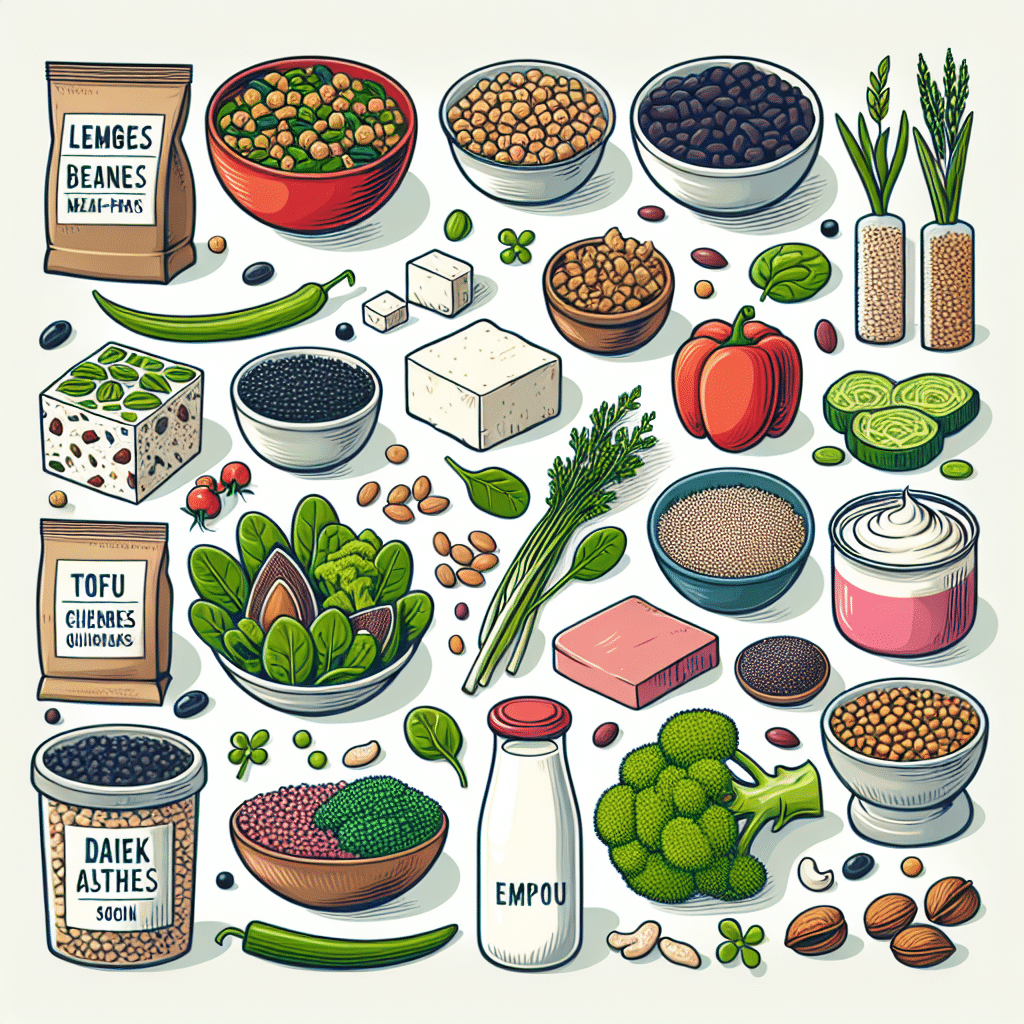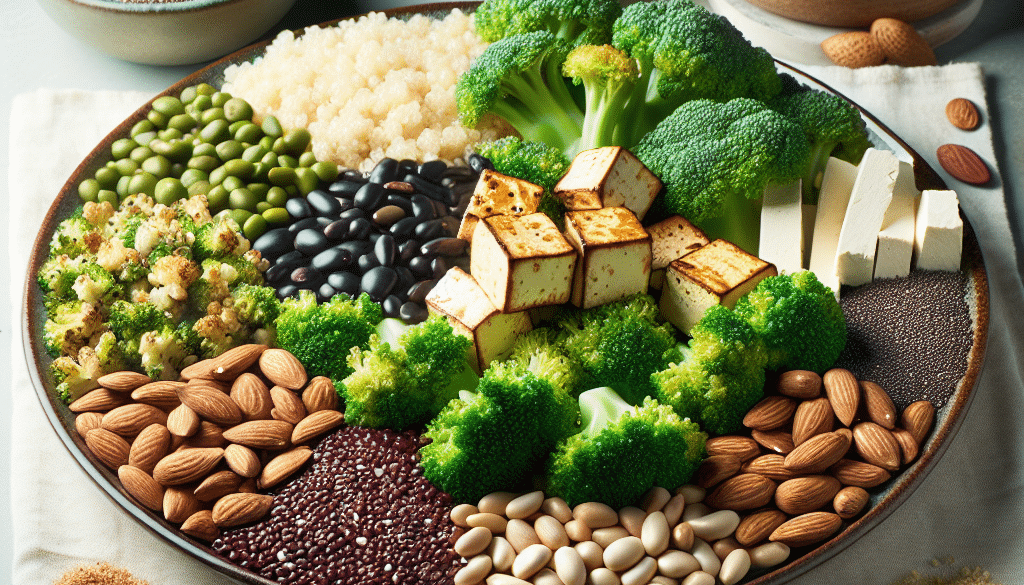What Can I Eat Instead Of Meat For Protein?
-
Table of Contents
- Top Plant-Based Protein Sources to Replace Meat
- Understanding Plant-Based Proteins
- Legumes: A Protein Powerhouse
- Nuts and Seeds: Nutrient-Dense Snacks
- Whole Grains: More Than Just Fiber
- Soy Products: A Versatile Protein Source
- Other Plant-Based Protein Options
- Case Studies and Statistics
- Conclusion: Embracing Plant-Based Proteins
- Discover ETprotein’s High-Quality Plant Proteins
Top Plant-Based Protein Sources to Replace Meat

As more people look to reduce their meat consumption for health, environmental, or ethical reasons, the question of how to maintain adequate protein intake becomes increasingly relevant. Fortunately, there are numerous plant-based foods that can provide the necessary protein your body needs. This article explores a variety of meat alternatives that are not only rich in protein but also offer a range of other health benefits.
Understanding Plant-Based Proteins
Proteins are essential macronutrients made up of amino acids, which are the building blocks of our body’s cells. While meat is a well-known source of complete protein, meaning it contains all nine essential amino acids, many plant-based foods offer substantial amounts of protein and can be combined to ensure a complete amino acid profile.
Legumes: A Protein Powerhouse
- Lentils: With about 18 grams of protein per cooked cup, lentils are a fantastic source of protein. They are also rich in fiber, iron, and folate.
- Chickpeas: Also known as garbanzo beans, chickpeas contain around 15 grams of protein per cooked cup. They are versatile and can be used in dishes like hummus, salads, and stews.
- Black Beans: These beans offer about 15 grams of protein per cooked cup and are excellent sources of fiber and antioxidants.
Nuts and Seeds: Nutrient-Dense Snacks
- Almonds: Almonds provide approximately 6 grams of protein per ounce, along with healthy fats, vitamin E, and magnesium.
- Chia Seeds: With about 5 grams of protein per ounce, chia seeds are also rich in omega-3 fatty acids and can be added to smoothies, yogurt, or oatmeal.
- Pumpkin Seeds: Also known as pepitas, these seeds contain around 7 grams of protein per ounce and are a good source of zinc and magnesium.
Whole Grains: More Than Just Fiber
- Quinoa: Quinoa is a complete protein, offering all nine essential amino acids. It provides about 8 grams of protein per cooked cup.
- Oats: A staple breakfast food, oats contain around 6 grams of protein per half-cup serving and are also high in fiber and magnesium.
- Brown Rice: While not as high in protein as quinoa, brown rice provides about 5 grams of protein per cooked cup and is a good source of complex carbohydrates.
Soy Products: A Versatile Protein Source
- Tofu: Made from soybeans, tofu contains about 10 grams of protein per half-cup serving. It’s incredibly versatile and can be used in a variety of dishes.
- Tempeh: Tempeh is a fermented soy product with a higher protein content, offering about 15 grams per half-cup serving. It has a firm texture and a nutty flavor.
- Edamame: These young soybeans are a snack favorite and provide around 17 grams of protein per cup.
Other Plant-Based Protein Options
- Seitan: Also known as wheat meat, seitan is made from gluten and provides about 25 grams of protein per 3.5 ounces. It’s a great meat substitute for its texture.
- Pea Protein: Extracted from yellow split peas, pea protein is often found in protein powders and meat substitutes, offering about 21 grams of protein per 28-gram serving.
- Spirulina: This blue-green algae packs around 8 grams of protein per two tablespoons, along with a host of nutrients like B vitamins, iron, and copper.
Case Studies and Statistics
Research has shown that individuals who adopt a plant-based diet can meet their protein requirements while also benefiting from a lower risk of chronic diseases. A study published in the journal Nutrients found that plant-based diets are associated with a reduced risk of heart disease, type 2 diabetes, and certain types of cancer.
According to the United Nations Food and Agriculture Organization (FAO), pulses such as lentils and chickpeas are not only excellent sources of protein but also have a low carbon footprint compared to animal proteins, making them a sustainable choice for both personal health and the environment.
Conclusion: Embracing Plant-Based Proteins
Incorporating plant-based proteins into your diet is not only possible but can be a delicious and healthful way to reduce meat consumption. By exploring the variety of legumes, nuts, seeds, whole grains, and soy products available, you can enjoy a diverse and nutritious diet that supports your protein needs and overall well-being.
Discover ETprotein’s High-Quality Plant Proteins
If you’re looking for high-quality plant-based protein options, ETprotein offers a range of products that cater to various dietary preferences and needs. Their selection includes organic rice protein, pea protein, and unique options like watermelon seed protein and mung bean protein. With a commitment to non-GMO, allergen-free ingredients, and high purity levels, ETprotein is an excellent choice for those seeking reliable plant-based protein sources.
About ETprotein:
ETprotein, a reputable protein and L-(+)-Ergothioneine (EGT) Chinese factory manufacturer and supplier, is renowned for producing, stocking, exporting, and delivering the highest quality organic bulk vegan proteins and L-(+)-Ergothioneine. They include Organic rice protein, clear rice protein, pea protein, clear pea protein, watermelon seed protein, pumpkin seed protein, sunflower seed protein, mung bean protein, peanut protein, and L-(+)-Ergothioneine EGT Pharmaceutical grade, L-(+)-Ergothioneine EGT food grade, L-(+)-Ergothioneine EGT cosmetic grade, L-(+)-Ergothioneine EGT reference grade and L-(+)-Ergothioneine EGT standard. Their offerings, characterized by a neutral taste, non-GMO, allergen-free attributes, with L-(+)-Ergothioneine purity over 98%, 99%, cater to a diverse range of industries. They serve nutraceutical, pharmaceutical, cosmeceutical, veterinary, as well as food and beverage finished product distributors, traders, and manufacturers across Europe, USA, Canada, Australia, Thailand, Japan, Korea, Brazil, and Chile, among others.
ETprotein specialization includes exporting and delivering tailor-made protein powder and finished nutritional supplements. Their extensive product range covers sectors like Food and Beverage, Sports Nutrition, Weight Management, Dietary Supplements, Health and Wellness Products, and Infant Formula, ensuring comprehensive solutions to meet all your protein needs.
As a trusted company by leading global food and beverage brands and Fortune 500 companies, ETprotein reinforces China’s reputation in the global arena. For more information or to sample their products, please contact them and email sales(at)ETprotein.com today.












